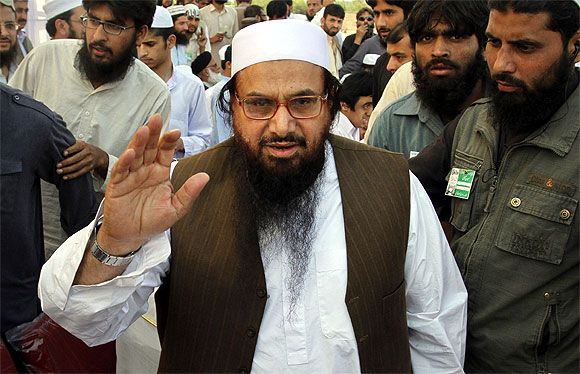
Pakistan on Thursday banned the 2008 Mumbai attack mastermind Hafiz Saeed-led Jamat-ud-Dawah and its charity wing Falah-e-Insaniat Foundation, amid intense global pressure to rein in the militant groups following the Pulwama terror attack that killed 41 Central Reserve Police Force soldiers.
A spokesman of the Interior Ministry said that the decision to ban these groups was taken during a meeting of the National Security Committee (NSC) chaired by Prime Minister Imran Khan at his office on Thursday.
"It was decided during the meeting to accelerate action against proscribed organisations," the spokesperson said in a statement.
"It was further decided that Jamat-ud-Dawah and Falah-e-Insaniat Foundation be notified as proscribed organisations by the Ministry of Interior," he added.
However, it remains to be seen how effective the latest ban would be on the two groups, which have the tacit backing of the political leaders and the security agencies.
Earlier, the two outfits were kept on the watchlist of the interior ministry.
According to officials, JuD's network includes 300 seminaries and schools, hospitals, a publishing house and ambulance service. The two groups have about 50,000 volunteers and hundreds of other paid workers.
The JuD is believed to be the front organisation for the Lashkar-e-Tayiba which is responsible for carrying out the Mumbai attack that killed 166 people. It has been declared as a foreign terrorist organisation by the US in June 2014.
The United Sates Department of the Treasury has designated its chief Saeed as a Specially Designated Global Terrorist, and the US, since 2012, has offered a $10 million reward for information that brings Saeed to justice.
Saeed was listed under United Nations Security Council Resolution 1267 in December 2008. He was released from house arrest in Pakistan in November 2017.
Pakistan's move comes amid mounting global pressure to act against the terrorist outfits operating from its soil.
Pakistan-based Jaish-e-Mohammad claimed the responsibility of the Pulwama suicide attack that killed 41 CRPF soldiers on February 14.
US President Donald Trump has repeatedly accused Pakistan of providing "safe haven" to terrorists and asked Islamabad to rein in the terror groups operating from its soil.
Iran and Afghanistan also accuse Pakistan of providing support to terror groups to carry out attacks in the neighbouring countries.
Last week, Iran asked Pakistan to crack down on militants who killed 27 of its Revolutionary Guards in an attack near the border or expect military action by Tehran 'to punish the terrorists'.
The NSC meeting also reviewed the National Action Plan against terrorism in detail. Services chiefs and key ministers were in attendance.
"We need to move to ensure that militancy and extremism are rooted from the society and the State never becomes hostage to extremists," Khan said as he directed both the interior ministry and the security institutions to immediately accelerate actions on ground.










 © 2025
© 2025